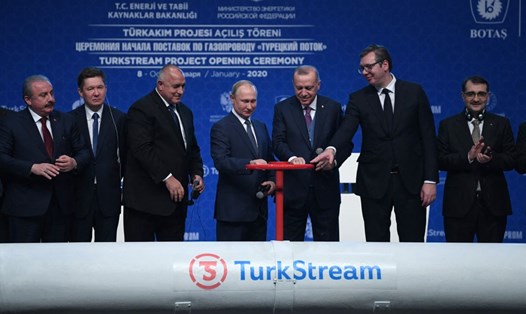Germany's Die Welt newspaper cited analytical data as saying that Russia's overtaking of the US to become the second largest gas supplier to the EU (after Norway) is a very symbolic event.
The European Union has said that eliminating dependence on Russian gas is one of the top priorities after the conflict in Ukraine broke out in February 2022. Since then, the expensive US liquefied natural gas (LNG) has taken up a large part of the market, exacerbating economic crises across the EU.
In the second quarter of 2024, Russian gas accounted for about 17% of the total EU gas imports, right above US supplies - Welt noted, citing data from the Bruegel research group based in Brussels.
European customers imported 12.27 billion cubic meters of US LNG in the second quarter of 2024, while Russia supplied 12.73 billion cubic meters to the bloc.
Russian supplies include liquefied natural gas and pipeline gas, which flow into the EU via Belarus, Ukraine and via the TurkStream gas pipeline (Türkiye Flow) in the Black Sea.
Ukraine receives transit fees for Russian gas through its territory. However, Kiev has threatened to suspend the operation after the current contract expires at the end of 2024. However, Ukraine has said it will open the door to third countries, such as Azerbaijan, to step up the use of Soviet-built pipeline infrastructure in the country.
Dmitry Birichevsky, head of the Economic Cooperation Department at the Russian Foreign Ministry, described the momentum for gas imports as a testament to the failure of the EU's sanctions policy.
"Although it is true that the indicators are significantly lower than before 2022, the reality has spoken for itself. Greece alone has increased its purchases of Russian gas fourfold in 2023 - Mr. Birichevsky told RIA Novosti on September 2.
The US has sought to replace Russia as an energy supplier to Europe since before the conflict in Ukraine. The Trump administration once called US LNG a "aracle of freedom" by pressuring EU countries to choose LNG over Russian gas. Norway has long been a leading gas supplier to the European Union market.
"In the context of the economic war imposing on us, we prioritize shifting foreign trade to countries in the east and south of the world," said Birichevsky, noting that Moscow currently considers the EU an unreliable customer.








